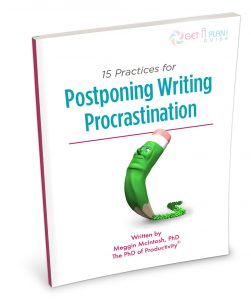Writing in Your Third Place by Meggin McIntosh, PhD
 If you have never heard of the concept of “third place,” here is what Wikipedia offers:
If you have never heard of the concept of “third place,” here is what Wikipedia offers:
The term was coined by Ray Oldenberg. It refers to places that are separate from home or the workplace and are ‘anchors’ of community life, which foster energy and creative interation.
Starbucks is one example of a company that targets wanting to be your third place, i.e., you have your home your office, and somewhere else (Starbucks) where you can do work and meet with people. The reason I bring it up in this week’s Top Ten Productivity Tips is because writing involves various types of energy expenditure, so being in a place where there is other mental, intellectual, emotional, and psychic energy is an excellent idea, as far as I’m concerned.
- Be willing to try a third place.
- Test out different ones until you know the exact place or type of place that works for you. For example, I wrote the first draft of this week’s tips in a hotel restaurant. There is smooth jazz playing (no words) and people at other tables talking, but none of it is distracting – or I would already be back in my hotel room! Hotel restaurants are a good third place for me – especially in the morning.
- Take one or more pads of paper with you at all times, but especially when you are headed to one of your third places. You don’t even have to know what you are going to write, but you want to be ready to capture whatever shows up.
- Just sit. Just be. You’re in a third place to access and draw from the energy of others who are there. Take a few minutes just to allow that energy to flow over you and seep in.
- If you are like me and wear glasses, take them off or don’t wear them if it is reasonable not to. Here’s why: It reduces your likelihood of engaging with anything else that is visually distracting in your third place.
- Don’t tell other people where you are because you may have friends who would love to come and find you and then that ruins the whole writing-in-an-uninterrupted-fashion idea…
- Take something specific to work on, such as
- Brainstorming for an article
- Editing a book chapter
- Mindmapping a grant proposal
- Composing a powerful conclusion to a speech you will be giving.
- Or any number of other possible writing tasks.
Note: Having something specific to work on does not mean you eliminate Tip #3, however.
- If you are taking your laptop, it is preferable to take it fully charged so that if there is not a convenient power source, you can still write.
- Stay off the Internet. The temptation to check email, Facebook, or your favorite news site may be too much to resist. Posting to Facebook is NOT writing and neither is answering email. You knew that didn’t you?
- Stay as long as you can, particularly when you are on a roll (or in the “zone”). But, when your time is up, know that having a third place is a wonderful alternative to always writing in our offices.
© Meggin McIntosh, PhD (also known as “The PhD of Productivity”®). One of the ways that you can learn from Meggin about productive writing is through her 30 Articles in Just 30 Days.
 Do you know any writers who procrastinate? Could that writer actually be you? We writers know perfectly well that we procrastinate, sometimes in very clever ways. In need of tips to help you stop? You’ll want the Get a Plan! Guide® to Postponing Writing Procrastination, part of the Get a Plan! Guides® series.
Do you know any writers who procrastinate? Could that writer actually be you? We writers know perfectly well that we procrastinate, sometimes in very clever ways. In need of tips to help you stop? You’ll want the Get a Plan! Guide® to Postponing Writing Procrastination, part of the Get a Plan! Guides® series.
Inside, you’ll find 15 practices to postpone your writing procrastination. You’ll receive the ideas and inspiration to do your work easier, faster, and in a more focused fashion.




